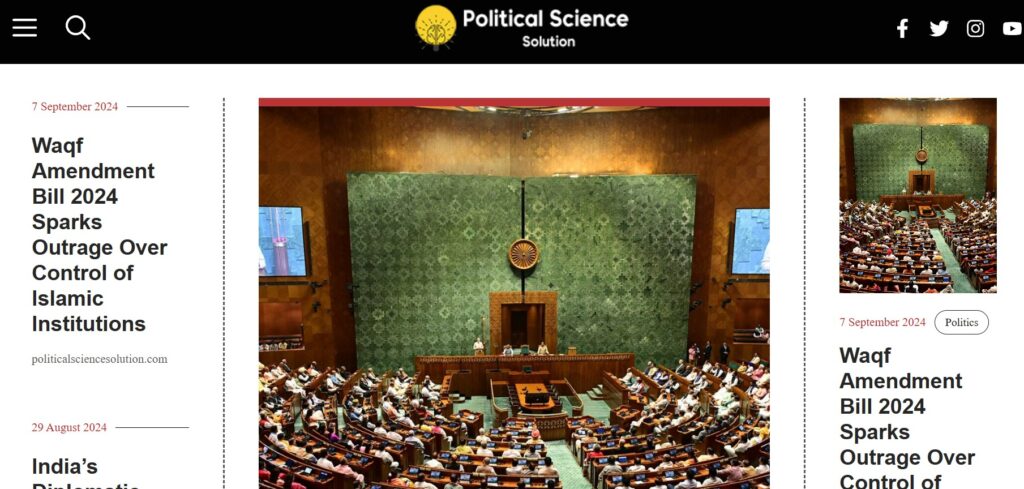
AI’s Impact on Global Politics: Opportunities and Challenges
Introduction
Artificial Intelligence (AI) is no longer a futuristic concept. It is already transforming industries and reshaping the political landscape. From improving national security to influencing election outcomes, AI’s role in global politics presents both opportunities and challenges. As nations race to develop AI technologies, the geopolitical landscape is shifting, with significant implications for governance, diplomacy, and power dynamics.
In this article, we explore how AI is influencing global politics and the key issues it raises.

What Is AI in Global Politics?
AI refers to machines or systems that simulate human intelligence. It involves tasks like learning, reasoning, problem-solving, and self-correction. In global politics, AI is used in data analysis, policy-making, military strategies, and electoral processes. AI can process large datasets and identify patterns that humans may overlook. This ability leads to more informed decisions in many political areas.
Technologies like machine learning (ML) and natural language processing (NLP) are becoming central to political strategies. Nations use AI to monitor cyber threats, automate surveillance, and improve administrative tasks. However, as AI adoption grows, concerns about privacy, ethics, and power imbalances among nations increase.
Opportunities Presented by AI in Global Politics
Enhanced National Security
AI has revolutionized national security. Governments now use AI to monitor and respond to threats in real-time. AI-driven systems can analyze vast amounts of data to detect and stop cybersecurity threats, terrorist activities, and military conflicts. For example, the United States, China, and Russia have invested heavily in AI for military applications. These applications include autonomous drones, surveillance systems, and intelligence tools.
AI also helps in intelligence gathering. It processes large data sets to find patterns that could indicate security risks. AI can also predict political instability or potential terrorist activities, enabling governments to take preventive actions.
Efficient Governance
AI can improve governance by making policy decisions more efficient and data-driven. Governments use AI for tasks such as traffic management, healthcare, and resource allocation. AI systems analyze public opinion, social media trends, and economic data to help make better policy decisions. For example, AI can predict the outcomes of certain policy choices, allowing governments to implement more effective strategies for economic growth or public welfare.
AI is also improving urban management. Cities like Singapore and Dubai use AI-based technologies to optimize transportation, waste management, and public services. This leads to better governance and a higher quality of life for citizens.
Data-Driven Election Campaigns
Political campaigns now use AI to enhance voter targeting and campaign effectiveness. AI tools analyze voter data to identify demographics, predict behavior, and tailor campaign messages. For example, during the 2016 U.S. presidential election, AI-powered analytics were used extensively for voter targeting with personalized ads.
AI also helps campaign managers allocate resources effectively. It can guide decisions on where to hold rallies or which voter groups to prioritize. As data-driven campaigns become more common, AI has become essential in shaping electoral outcomes.
Diplomatic and Negotiation Assistance
AI is changing diplomacy by assisting with negotiations and international relations. AI tools provide diplomats with real-time translations, historical data, and insights into the other parties’ behavior. This helps diplomats make more informed decisions. AI-driven translation tools, for example, break down language barriers in international negotiations.
AI also assists in navigating complex international agreements. It analyzes past treaties and suggests optimal strategies. By streamlining these processes, AI helps countries negotiate better terms in trade deals, climate agreements, and security pacts.
Challenges Posed by AI in Global Politics
Cybersecurity Threats
While AI enhances security, it also creates new risks. Hackers can use AI to launch cyber-attacks or manipulate information. Deepfakes, for example, use AI to create realistic but false videos or images. These can spread misinformation or disrupt political processes.
Moreover, AI systems themselves can be hacked. If a military AI system is compromised, it could be repurposed for attacks or espionage. These vulnerabilities pose a significant threat to national and international security.
Ethical Dilemmas and Bias
AI raises ethical questions, especially regarding bias. AI systems are trained on data, and if that data contains bias, the AI can amplify it. For example, AI tools used in criminal justice in the U.S. have shown bias against minorities, leading to unfair outcomes.
Ethical concerns extend to AI-driven weapons. Autonomous drones and AI military systems bring up serious moral questions. Who is responsible when an AI makes a life-or-death mistake? This has led to calls for international regulations on AI weaponry.
Threats to Democracy
While AI can improve the efficiency of political campaigns, it also poses significant risks to democracy. One of the major concerns is the use of AI to manipulate public opinion. AI algorithms can create targeted misinformation campaigns by tailoring content to specific voter groups, sometimes spreading false or misleading information. This was evident during the 2016 U.S. elections, where AI-driven systems were used to spread disinformation and influence voters.
Another issue is the use of AI in surveillance, which can undermine civil liberties. Governments may employ AI-driven surveillance systems to monitor citizens, collect data without consent, and stifle political dissent. In countries with authoritarian regimes, this can lead to further erosion of democratic principles, as dissenters may be targeted or suppressed based on AI-monitored activities.
Moreover, the rise of deepfakes—AI-generated videos or images that appear real—poses a direct threat to democratic processes. Deepfakes can be used to discredit politicians, spread false narratives, or even create fake news, leading to public confusion and mistrust in the electoral process. The potential for AI to manipulate public perception in ways that are difficult to detect could result in reduced transparency and trust in democratic institutions.
Lastly, AI’s ability to gather vast amounts of data allows political entities to micro-target voters with extreme precision, sometimes creating filter bubbles that reinforce people’s pre-existing beliefs and limit exposure to diverse viewpoints. This can polarize the electorate and weaken democratic discourse by reducing the likelihood of open, balanced discussions on key political issues.
Conclusion
AI is revolutionizing global politics, presenting both opportunities and challenges. From improving national security and governance to influencing elections, AI’s impact on the political landscape is profound. However, the ethical, security, and democratic risks cannot be ignored. To ensure that AI serves the common good, global leaders must work together to create regulatory frameworks that address these concerns. As AI continues to evolve, its role in global politics will be critical in determining the future of democracy and governance.




